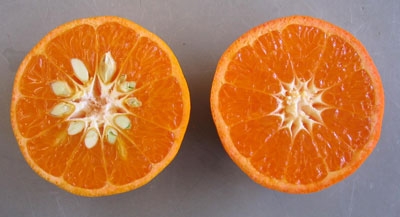
Posts Tagged: Tango
Scientific ingenuity produces a fantastic fruit
UC scientists took a page from nature when they developed the Tango mandarin. Tango is the result of a mutation induced by irradiating budwood of W. Murcott mandarin. The process mimics nature’s manner of improving fruit. Radiation from the sun or natural errors during cell division can cause a single branch or fruit to mutate and develop unique characteristics, which scientists call a “sport.” People have been reproducing favorable sports for generations. In fact, all navel oranges are sports – natural mutations of oranges with seeds or other navel oranges.
W. Murcott mandarins, originally from Morocco, are favored for their deep orange color, easy-peel rind and tangy-sweet flavor. However, when planted within five miles of other seed-bearing citrus – such as Clementine mandarins, lemons or grapefruit – they can be cross-pollinated by bees and become seedy. The Tango maintains the best W. Murcott traits, but because it produces very little viable pollen, it is virtually seedless wherever it is grown.
“This is the most promising mandarin the university has ever produced,” said UC Riverside genetics professor Mikeal Roose.
The Tango mandarin was patented, and registered trees were established by the UC Citrus Clonal Protection Program. Distribution of budwood to citrus nurseries began in June 2006 and was limited exclusively to California growers for one year. Tango was introduced into Florida in 2007 and the trees were available internationally under exclusive licenses since 2009. Tango trees are available to home gardeners through retail nurseries.
The Tango was made possible by a UC and citrus industry partnership going back nearly 15 years. Roose and staff research associate Tim Williams began field testing the fruit in 2001. The research and evaluation program was supported by the Citrus Research Board.
“What’s exciting is the parent variety of the Tango is a good piece of fruit,” said Ted Batkin, director of the Citrus Research Board. “It is without a doubt the most widely planted variety that we have released in the past 25 years.”
California is the nation's leader in producing fresh citrus fruit, and many of the fruit is exported overseas, providing nutritious, low-calorie food to consumers worldwide.

W. Murcott, left, and Tango, right.
UC's Tango mandarin touted in Smithsonian

The story recounts how plant geneticist Mikeal Roose used irradiation on W. Murcott budwood to induce mutations that improve the fruit.
“Farmers have long selected citrus varieties that are low-seed, that have the same kinds of chromosomal rearrangements stimulated by the same thing—there’s natural radiation around all the time and it can affect the trees at any time.”
The advantage of inducing mutations, Roose explained, rather than waiting for the sun to trigger genetic variation, is that it can be targeted toward manipulating one particular feature—a kind of rapid prototyping for agriculture. The radiation accelerates the output of new genetic compositions. Each is then cultivated, screened and tested with the hope that at least one offspring will be reliably superior to its antecedent.
'Doom the Broom' demo is scheduled Thursday in Paradise
Chico Enterprise-Record
A live fire demonstration will help illustrate the need to clear growth from around structures and to be aware of the growth of Scotch, Spanish and French broom Thursday in the parking lot at 5400 Clark Road, Paradise, Calif. Glenn Nader, UC Cooperative Extension advisor for Sutter-Yuba counties, an expert in livestock and natural resources, will talk about spraying herbicides to control the weeds.
The event will go from 10:30-11:45 a.m., rain or shine. The fire demonstration will be at 11:05 a.m.
Tango to be a big hit
A new, virtually seed-free mandarin will for the first time be sold in California grocery stores, but consumers may not even notice, according to an AP story by Jeff Nachtigal published late last week. Google News reports that the article made its way into about 200 news outlets.
The story was also written up by reporter Mark Muckenfuss of the Riverside Press-Enterprise in mid-January.
UC Riverside began releasing budwood for Tango mandarins in 2006; more than a million trees are now growing in California. Their first commercial crop is being harvested this month.
Tango is the result of a mutation induced by irradiating budwood of W. Murcott mandarin in UC Riverside genetics professor Mikeal Roose's lab. It has all the good qualities of W. Murcott, but doesn't produce seeds even if bees visit the blossoms covered in pollen from other citrus trees.
Roose told Nachtigal the new mandarin is "like a new car with all the details of the previous year's model, but one that gets 10 miles more to the gallon."
"It's probably the best piece of fruit that's come along for years for citrus growers," Roose was quoted.
Roose said Tango will most likely be marketed as Cuties and Delites. Some may be sold under the Tango name at grocery stores and farmers markets.

W. Murcott mandarin (left) and Tango (right).
